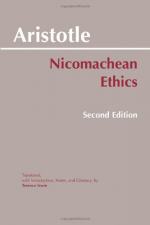
|
| Name: _________________________ | Period: ___________________ |
This test consists of 5 short answer questions, 10 short essay questions, and 1 (of 3) essay topics.
Short Answer Questions
1. How does Aristotle say the lawmakers ought to treat people who act beautifully?
2. At what does every action seem to aim, according to Aristotle?
3. What is the literal prize for boxers, according to Aristotle in III.9?
4. In Aristotle's thinking, the function of man is an activity of soul which follows upon or implies the soul's possession of what?
5. The equitable distribution of justice is a certain kind of what, according to Aristotle?
Short Essay Questions
1. What does Aristotle mean by saying that every art, inquiry, action, and choice aims at some good?
2. What is the tripartite distinction in the soul that Aristotle makes in Chapter 13 of the first book?
3. According to Aristotle, in what way is justice reciprocal, and why?
4. The magnanimous man is concerned with what things and in what manner, according to Aristotle?
5. What is the relationship of virtues to extremes of excess and deficiency in the philosophy of Aristotle?
6. With what virtuous dispositions are Book IV, Chapters 6-9 concerned?
7. What is the content of the suggestion of Aristotle regarding overcompensation and the acquisition of personal virtue?
8. What is the relationship that Aristotle cites as existing between opposites in coming to know what is or is not the right way for a thing to be, such as health?
9. What is Aristotle's distinction between the sort of injustice that is unlawful and the sort of injustice that is inequitable?
10. Why does Aristotle say that the things deliberated about are not ends?
Essay Topics
Write an essay for ONE of the following topics:
Essay Topic 1
As one of the virtues primarily dealing with the irrational part of the soul, temperance figures centrally in Aristotle's conception of virtue. Compose an essay which analyzes Aristotle's presentation of the virtue of temperance. What part of the soul does temperance restrain? How does it restrain it? With what is temperance concerned? What stands in opposition to temperance? Why is temperance important to being a virtuous person?
Essay Topic 2
Amidst virtues that seem more magnificent, oftentimes Aristotle's considerations of the virtue of good humor--sometimes called ready wit--are glossed over. Analyze this virtue in a thoughtful essay, examining the importance of humor to an individual and to society. What constitutes the virtue of good humor? What are the vices in opposition to it? Why are these vices detrimental to individuals and society as a whole? Why is good humor important to society? How does humor aid man in seeking his ethically-proper end?
Essay Topic 3
Analyze in a comparative essay the three archetypal kinds of friends--utility, pleasure, and virtue--as they relate to man and to man's happiness. Which is the most perfect and truest kind of friendship, and why? What does true friendship do for man's moral character? What does true friendship have to do with happiness? What is the relationship between happiness and the lesser levels of friendship? What is the principal lesson that one ought to take away from Aristotle's extensive discussion of the topic of friendship?
|
This section contains 1,159 words (approx. 4 pages at 300 words per page) |

|




